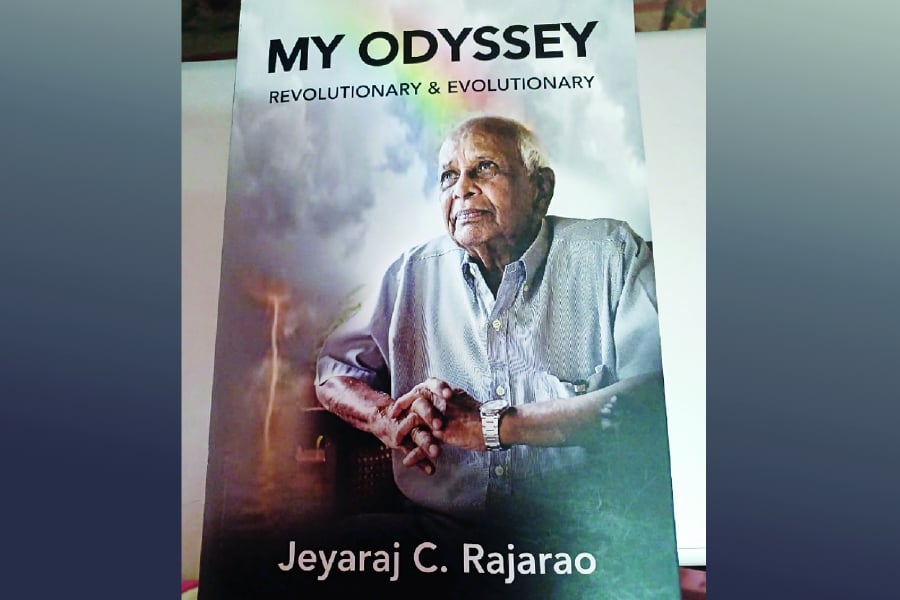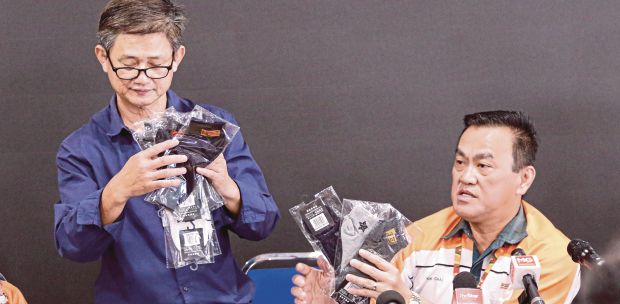WHEN 90-year-old Penang-born Datuk Jeyaraj Christopher Rajarao (JCR) had his autobiography My Odyssey — Revolutionary & Evolutionary launched recently, I hadn't the faintest idea who he was until I struggled through 594 pages of his thoughts!
He had chronicled his life story from his date of birth on Dec 17, 1932, which gave a good inkling of how things were then as it was about the same period that my parents came to Malaya from China.
In a nutshell, JCR was a witty wizard with words during his younger days, a brilliant scholar, an innovative teacher and administrator, and a friend to many. He had rubbed shoulders with many notables. Tun Musa Hitam, his varsity mate at University of Malaya when its campus was in Singapore then, officiated at the launch.
Being someone "who has seen it all", JCR was bold in many of his assertions. He didn't hold back his disdain for certain non-pluralistic government policies and even assailed some well-known politicians whose ilk he found disturbing, including one much revered personality across the Causeway.
The book was, in part, his dedication and a labour of love to his late and beloved wife, Datin Kamala, as countless references were made of her from the time of his "puppy love" courtship till his retirement. Despite his advanced age, it's commendable that he managed to capture thoughts that date back almost a century ago.
My Odyssey was also where he took the opportunity to atone for his bull-headedness that led to conflicts (usually with those in authority or unreasonable people whom he disliked). He had asked for forgiveness on many occasions in the book, stressing that his behaviour could have stemmed from his spirit of being true to oneself.
The book's value stems from JCR's (for Jesus Christ Resurrected, he claims!) detailed narration of his childhood days in the 1930s in Penang, life during the Japanese occupation from 1941, his youthful exuberance in wanting to fight for India against the colonialists he detested to the hilt, his school and university days and finally his colourful career.
His insights into the Indian professional and middle classes in Malaya and the Straits Settlements at the turn of the century and leading up to the country's independence in 1957 and formation of Malaysia in 1963 are immensely useful.
His perceptive narratives of educated relatives and friends, and friends of friends who were doctors, educators, administrators, engineers and even persons of the cloth from India and Ceylon (now Sri Lanka) and how they came to share their skills to build the country into what it is today, are indeed perspicacious.
This is in contrast to the common and overused narratives that Indians came to work in rubber estates or labour lines.
JCR, originally an Anglican Christian until he turned into an atheist, offered a different perspective — these were Indians who lived in comfortable houses, played the piano or violin, drove cars, worked alongside their British superiors and even mingled with them in social and church settings!
As a Profoundly Forthright Student (PFS) of the famed Penang Free School (PFS), JCR never failed to recount several times that it's the oldest school in Southeast Asia (1816) and his constant use of and reference to the PFS "Old Boy" network.
The fact that JCR (Just Clowning Raucously & Joke-Creating Rowdy — his own words) had been garlanded as a young boy by then Indian prime minister Jawaharlal Nehru and by Indian freedom fighter Subhas Chandra Bose may have given him a lot of gumption when dealing with people.
I perceived that he was easily slighted and would fly into a rage if he didn't like something.
Being a vociferous socialist and sticking to his guns as to how Western imperialists had ravaged Asia and elsewhere, he even dropped out of a PhD programme at the renowned School of Oriental and African Studies, University of London, when he refused to delete passages that had criticised them.
JCR even skipped two dinner functions graced by the late Queen Elizabeth II in 1959 and 1960 because of his attitude towards colonialists.
Upon reflection, he wrote: "Presently, I feel I should have gone just to meet the sweet and gracious lady who personally had nothing to do with the colonisation nor administration of the annexed countries. Well, sometimes my stupidity and stubbornness can only expose my childish but sincere snobbery."
Career-wise, JCR was truly imaginative and innovative, and that won him many accolades as can be discerned from the story-telling.
But the insightfulness of My Odyssey is sullied by the lack of competent editing. It sorely needs the JCR (Just Correct Rigorously) treatment before it sees its second printing.
The writer is a former Bernama chief executive officer and editor-in-chief






